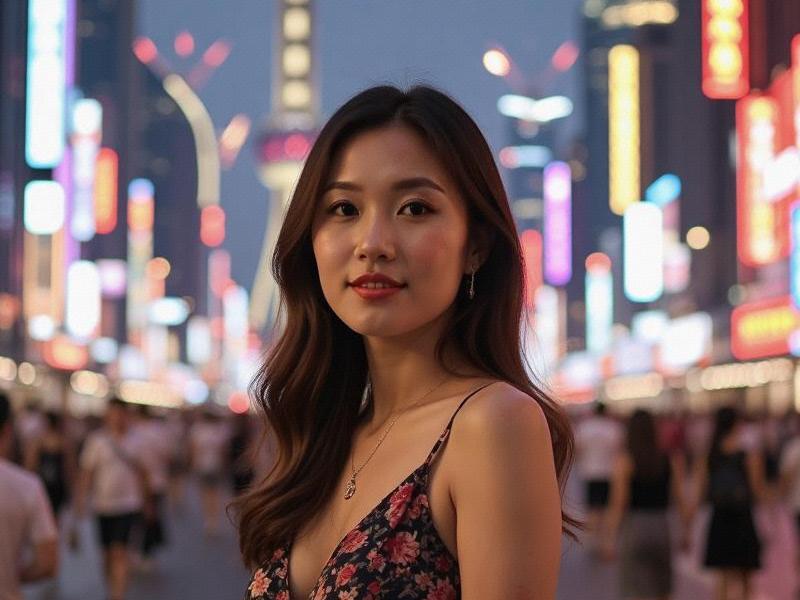Shanghai Nights: How China's Cosmopolitan Capital Redefines Nightlife Entertainment
⏱ 2025-06-14 00:25 🔖 爱上海同城论坛
📢0℃

The neon lights of Shanghai's entertainment districts tell a story of cultural metamorphosis. Along the Huangpu River, where jazz clubs once flourished in the 1920s, a new generation of ultra-luxury entertainment complexes now caters to China's growing elite. The city's entertainment venue industry has grown into a $3.8 billion sector, with over 4,200 licensed establishments operating across twelve districts.
The KTV Revolution:
Traditional karaoke venues (KTV) have undergone remarkable transformations. The new "Super KTV" concept combines private singing rooms with Michelin-starred dining and sommelier services. Dragon One Club in Xuhui District features 88 themed rooms with rotating stages and professional recording studios, while MUSEK's "Sound Gallery" offers vocal coaching from former opera stars. Industry data shows high-end KTV revenue grew 42% in 2024 despite overall market contraction.
Luxury Lounge Culture:
Shanghai's business entertainment scene has shifted from banquet halls to exclusive membership clubs. The Bund Finance Club requires $200,000 annual fees but provides discreet meeting spaces with panoramic views and private elevators. More innovative is Cloud Nine's "Floating Lounge" - a helium balloon platform that ascends 300 meters above Lujiazui for sunset cocktails, licensed as a temporary airspace venue.
上海龙凤419自荐
Nightclub Innovations:
Electronic dance music venues now incorporate cutting-edge technology. TAXX's new location features biometric entry systems, AI-powered drink recommendations, and a kinetic dance floor that generates electricity from movement. Myst in Jing'an District has pioneered "cultural fusion nights" where traditional Chinese instruments perform with DJs, creating a unique East-West electronic sound.
Regulatory Challenges:
Shanghai's entertainment operators navigate complex licensing requirements. The 2024 "Healthy Nightlife" regulations mandate facial recognition at all venues and midnight closures for non-membership establishments. However, creative solutions emerge - some clubs now operate as "private art galleries" with performance licenses, while others utilize temporary event permits for special occasions.
上海贵族宝贝自荐419
Cultural Preservation:
Despite modernization, traditional tea houses and jazz clubs maintain their appeal. The Peace Hotel's Jazz Bar still hosts octogenarian musicians who played for 1930s gangsters, while Tianzifang's hidden speakeasies preserve Shanghai's concession-era charm. The municipal government now subsidizes 17 historic venues as "cultural preservation sites."
Future Trends:
Industry analysts identify several emerging patterns:
上海夜网论坛 1. "Wellness Nightlife" combining clubbing with health services (oxygen bars, IV therapy lounges)
2. Corporate-owned entertainment complexes integrating workspaces with leisure facilities
3. Virtual reality venues allowing digital nomads to experience Shanghai nightlife remotely
4. Blockchain-based membership systems ensuring privacy while complying with regulations
As Shanghai positions itself as a global entertainment capital, its venues continue redefining nightlife sophistication. From the laser-lit dance floors of Found 158 to the whispered deals in Huangpu's private clubs, the city offers after-dark experiences unmatched in Asia. The challenge remains balancing innovation with tradition, luxury with accessibility, and excitement with social responsibility in China's most dynamic after-hours playground.
Shanghai 2040: The Vertical City Revolution Redefining Urban Living"Neo-Cheongsam Revolution: Shanghai's Tech-Infused Femininity Reshaping Global Beauty Norms"The Shanghai Woman Phenomenon: How China's Most Cosmopolitan Women Are Shaping Global Perceptions of Chinese Femininity【城市镜像】从石库门到陆家嘴:上海女性的十二时辰Shanghai 2040: Building the Sustainable Megacity of TomorrowThe Cultural Awakening: How Shanghai is Redefining China's Creative EconomyThe Yangtze River Delta Megaregion: How Shanghai and Its Neighbors Are Creating China's Most Dynamic Economic Zone【城市肖像】上海女性的千面风华:从弄堂旗袍到数字游民"Circuitboard Qipao: How Shanghai's Women Are Programming Tomorrow's Beauty Standards"Neon Renaissance: How Shanghai's Entertainment Clubs Are Writing the Future of Urban Nightlife
【水岸重生录】苏州河下游的沪苏双城实验【夜上海浮世绘】"百乐门"传奇:探秘民国第一舞厅的世纪沉浮【流金岁月】上海名媛的世纪审美革命【时代镜像】上海女子的千面风华:从月份牌美人到数字缪斯的百年嬗变"的格式要求
- 标题、关键词、描述、内容四部分缺一不可
- 内容要体现新闻专业性
- 需要包含上海及周边元素
- 文章要有深度和可读性
3. 注意事项:
- 避免生成调查报告
- 保持新闻的客观性和专业性
- 可以适当融入历史元素
- 确保内容真实可信
- 从文化、社会、经济等角度切入
- 注意上海与周边区域的联动关系
以下是为您准备的上海及周边主题深度报道:【城市记忆】亭子间与智慧社区:一个国际大都市的市井基因解码【摩登密码】从月份牌到元宇宙:上海女性的百年形象进化论【夜上海进化论】从百乐门到量子酒吧:解码都市夜生活的文化基因【大上海都市圈进行时】2025沪苏浙皖同城化生活全景图【魔都密码】从外滩到元宇宙:解码上海城市基因的五重奏

